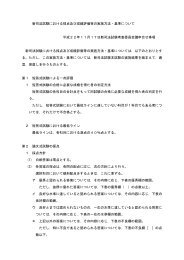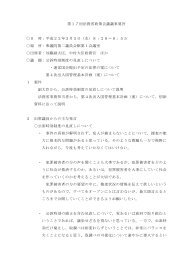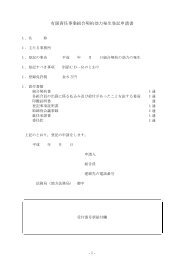FOREIGN DIRECT INVESTMENT IN MYANMAR
FOREIGN DIRECT INVESTMENT IN MYANMAR
FOREIGN DIRECT INVESTMENT IN MYANMAR
You also want an ePaper? Increase the reach of your titles
YUMPU automatically turns print PDFs into web optimized ePapers that Google loves.
1<strong>FOREIGN</strong> <strong>DIRECT</strong><strong><strong>IN</strong>VESTMENT</strong> <strong>IN</strong><strong>MYANMAR</strong>
1IntroductionEconomic Reform in MyanmarThe State Constitution of the Republic of the Union of Myanmar, Article 35 ofthe Constitution clearly declared that the Economic system of the Union ismarket economy system.This new constitution, implemented on January 31, 2011 after the generalelectionin November 2010. Then the new era is emerging.The new President U Thein Sein came to office in March 31, 2011. Hepromptly declared in his inaugural speech that “it was no longer ruler-basedeconomic system and no more exercising cronyism. There also was to be nopermit for grafts. He also expressed that “there are many steps to be taken andto work hard.” His mentioned steps including legislation rule of law and thecountry’s basic infrastructure. He also committed that the urgent need is toamend the existing laws and business sector
3For several reasons, Myanmar, remains worthy of consideration for investmentdue to:a population of approximately about 64 million (4.5 million inYangon);vast and virtually untapped natural resources;a relatively educated labour force and low wages;its strategic location in the region;sea and air links within the Asia region and beyond;
4Myanmar's goods benefit, as a developing nation from the GeneralizedSystem of Preferences in trade with most developed nations (i.e. lower importduties and not subject to quotas); access for 100 per cent foreign-owned enterprises;familiar business structures and commercial laws (based on theBritish law codes of the pre-independence India Statutes);English being widely spoken and usually used when dealing withforeigners;significant incentives under the Foreign Investment Law for largerinvestments; and member country of ASEAN.
ECONOMIC PRIORITIES5Since late 1988 the Government of the Union of Myanmar has madesignificant economic reforms and introduced new liberal trade policies topromote the development of the Myanmar economy. The ''four economicobjectives'' of the nation under the present Government are the:development of agriculture as the base as well as all-round developmentof other sectors of the economy;proper evolution of the market-oriented economic-system;development of the economy, inviting participation in terms of technicalknow-how and investments from sources inside the country and abroad;andinitiative to shape the national economy must be kept in the handsof the State and the national peoples.
<strong>FOREIGN</strong> <strong><strong>IN</strong>VESTMENT</strong> POLICY6Since late 1988 the Government has been actively encouragingforeign investment in Myanmar. Its main foreign investment policyobjectives are started as the:Adoption of a market-oriented system for the allocation ofresources.Encouragement of private investment and entrepreneurial activity.Opening up Myanmar's economy to foreign trade and investmentwhich includes• promotion and expansion;• exploitation of natural resources which require heavy investment;• acquisition of high technology;• developing production and services industries involving large capital;• creating local employment opportunities;• developing of works which would save energy consumption; and• regional development.
OPPORTUNITIES7The Government has identified a number of potential investmentopportunities for foreign investors and has also embarked on aprivatization programme.
LEGAL SYSTEM8The legal system of the Union of Myanmar is a unique combination of the customarylaw of the family, codified English common law and recent Myanmar legislation.The principles of English common and statutory law were implanted in Myanmarby the British law codes of the pre-independence India Statutes.These statutorylaws, based on and incorporating the English common and statutory law of thetime, include the Arbitration Act, Companies Act, Contract Act, EvidenceAct, General Clauses Act, Negotiable Instrument Act, Registration Act, Sale ofGoods Act, Transfer of Property Act, Trusts Act and the Civil and CriminalProcedure Codes.Where there is no statue regulating a particular matter the Courts are to applyMyanmar's general law, which is based on English common law as adopted andmoulded by Myanmar case law, and which embodies the rules of equity, justiceand good conscience. Where there is no relevant statutory general law on point ,the Myanmar Courts are obliged to decide the matter according to justice, equityand good conscience.
Incentives9A foreign investor (whether investing through a joint venture or a 100 per cent ownedentity) manufacturing goods or providing services in Myanmar under the ForeignInvestment Law will be granted an exemption from income tax for three consecutiveyears. inclusive of the year of commencement.In addition, any one or more of the following incentives may be granted by theMyanmar Investment Commission to the foreign investor: Exemption or relief from income tax on the profits of the business kept in a reserve fund andreinvested in the business within one year after the reserve is made. Accelerated depreciation in respect of machinery, equipment, building or other capital assetsused in the business, at a rate approved by the Commission. Relief from tax on up to 50 per cent of the profits accursed from the export of goodsproduced in Myanmar. The right to pay foreign employees' income tax and deduct such payments from assessableincome.
10 The right to deduct from assessable income expense incurred in respect ofnecessary research and development carried out within Myanmar. The ability to carry forward and set off losses up to three consecutive yearsafter the year in which the loss is sustained. Exemption from commercial tax on export-oriented commodities. Exemption or relief from customs duty, licensing requirements and internalspare parts and materials used in the business and deemed required by theCommission during the initial period/ period of construction. Exemption or relief from customs duty, licensing requirements and internaltaxes on the import of raw materials imported within the first three years' ofcommercial production following start up/ the completion of construction.The incentives actually granted by the Commission to the foreigninvestor are specified in the permit. Section 21 o f the ForeignInvestment Law.
11In addition to the above tax incentives,-Foreign investors holding a permit under the Foreign Investment Law are entitled to leaseland for up to 30 years from the Government and may be exempted from customs duties andinternal taxes and from obtaining an import license form the Ministry of Commerce for theimport of certain capital investment items and raw materials.Also, the Foreign Investment Law guarantees that foreign investment under a ForeignInvestment Law permit shall not be nationalized and the ability of the Foreign investor torepatriate '' the rightful entitlement of the foreign investor'' in foreign currency after thetermination of the business. A permit under the Foreign Investment Law also enables foreign employees of thecompany resident in Myanmar to repatriate their savings.
<strong>IN</strong>VEST<strong>IN</strong>G UNDER THE COMPANIES ACT12For smaller investments on where the foreign investor does not wish to gothrough the Foreign Investment Law procedures, there is an alternativeway of doing business in Myanmar, under the Myanmar Companies Act1914 and Companies Rules 1940.The Companies Act governs the activities of both locally and foreignincorporatedcompanies wishing to carry on business in Myanmar and is ina form similar to early company law codes of other former British coloniesin the region and England, which codes remain the foundation of thecurrent company law in those countries.
Application for a Permit to Trade13The application for a Permit to Trade is to be submitted along with the application forincorporation of the company or registration of a branch to the Directorate ofInvestment and Company or Administration. Where a permit under the ForeignInvestment Law is being applied for, the Permit to Trade application and companyincorporation or branch registration steps are to be followed only after issuance ofthe Foreign Investment Law permit. The application for a Permit to Trade underthe Companies Act must be in the prescribed form and accompanied by thefollowing documents.The Government is also seeking to encourage foreign investment in thedevelopment of golf course, beach resorts, tourist villages, amusement parks,recreational centres, serviced apartments, condominiums, office complexes andinfrastructure projects such as airports, roads, railways, telecommunicationsfacilities, etc.The right of any person (whether citizen or foreign, individual or company) to carry anyeconomic activity or enterprise, apart from the 12 areas of economic activity specifically"reserved" to the Government, is enshrined in the State-owned Economic Enterprises Law1989. The following common entities are recognized and available for foreigninvestment/ trade in such economic activities or enterprise. As to incorporationrequirements, see below under "Incorporation“.
<strong>IN</strong>VEST<strong>IN</strong>G UNDER THE <strong>FOREIGN</strong><strong><strong>IN</strong>VESTMENT</strong> LAW14Although not always possible or advisable to obtain a permit under the ForeignInvestment Law, the benefits attaching to investments under a Foreign Investment Law permitcan be substantial. In addition, for those foreign investors who do invest under the ForeignInvestment Law, a permit application and relevant documents addressing all areas appropriateto the proposed operation in Myanmar (including all other necessary approvals) can effectivelyprovide a “one stop” approval process only dreamt about in many other countries in the region.For large-scale projects, serious thought should be given to investing under theForeign Investment Law which provides significant tax and other incentives. However, suchinvestments must comply with a rigorous set of criteria and may be subject to significantconditions as to the operation of the investment.In practice, any investment requiring Government land and all joint ventures withState-owned economic enterprises or any part of the Government are subject to and must applyunder the Foreign Investment Law. Also, joint ventures to be formed with local private citizensor entities which have obtained approval or concessions under the Citizens Investment Law1994, must obtain, prior to formation, a permit under the Foreign Investment Law. Failure toobtain a Foreign Investment Law permit in these circumstances will breach the CitizensInvestment Law and will expose the joint venture company (and each of the shareholders) to thepossibility of fines and, more importantly, of being blacklisted from any Government approvalfor any future business venture in Myanmar.
Foreign Investment Policy15The Government’s main foreign investment policy objectives, which will be consideredwhen appraising an application under the Foreign Investment Law are.Adoption of a market-oriented system for the allocation of resources.Encouragement of private investment and entrepreneurial activity.Opening up Myanmar’s economy to foreign trade and investment which includespromotion and expansion of reports;exploitation of natural resources which require heavy investment;acquisition of high technology;developing production and services industries involving large capital;creating local employment opportunities;developing of works which would save energy consumption; andregional development.
16In order to provide more specific guidance to potential foreign investors, some 85types of activities have been specified as open to foreign investment. Annexure 2 tothis Chapter broadly outlines the areas declared available for investment under theForeign Investment Law. A foreign investor may apply for and obtain a permitunder the Foreign Investment Law for an economic activity not so specified,provided the foreign investor can explain how the activity would be mutuallybeneficial to Myanmar and the foreign investor.
Application Procedures17A foreign investor wishing to invest in Myanmar under the Foreign InvestmentLaw must apply to the Myanmar Investment Commission in the prescribed formfor a permit, for the Commission’s permission to undertake the proposedinvestment. Alternatively, the permit may simply not be renewed at the end of therelevant two-year period.Paragraph 7 of “Procedures Relating to the Union of Myanmar ForeignInvestment Law” (Notification No. 11/88).
Amended foreign investment lawset for July 4 parliament session18Myanmar’s amended Foreign Investment Law will be resubmitted toparliament on July 4.Key changes to the draft that was submitted earlier this year concern landuse. President U Thein Sein highlighted the importance of workable lawsand regulations to potential investors during his state of the union addresson national television on June 19. “That is why the needed laws andregulations are drawn again according to the international regulations andsoon, the foreign investment law will be submitted to the PyidaungsuHluttaw.”Also, the draft Myanma Special Economic Zone Law has been finishedand after getting opinions from respective departments and businessorganistations, it will be submitted to the Hluttaw.The financial, taxation, trade, investment and industrial regulations withinthe draft law have also been amended.The country’s economic doors were open and he welcomed investors.
19An additional amendment changes the duration of investment from an initialperiod of 30 years, followed by two 15-year extensions to a 50-year investmentfollowed by two 10-year periods.The amended law enables companies to form joint ventures with domesticpartners by putting in at least 35 percent of the investment or enter the countryas wholly owned foreign enterprises. However, some sectors would remainprotected and would not be open to 100pc-owned foreign firms.The economic situation of Myanmar in 2012 has improved from before.It could be considered that there are not any situations for potential investors tobe worried about and the situation is looking good.Locals who rent land to foreign investors also opt to use the lease money tobuy a share in the project, which is one way of providing extra opportunitiesfor people.Although the Myanmar Foreign Investment Law has not passed yet we feelthat poople should be prepared.While huge multinationals had not begun investing in Myanmar yet, a patientapproach would yield dividends in futures.
20US sanctions were only eased about a month ago, so it will take some timefor big investments to come. And the investment law is going to passedsoon.


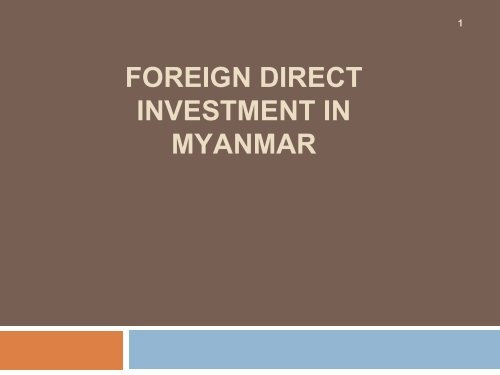

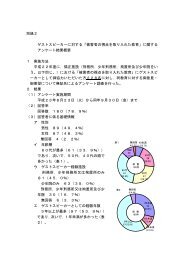
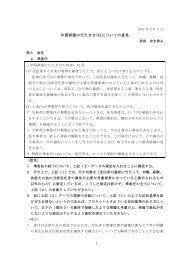
![論文式試験問題集[民事系科目第1問]](https://img.yumpu.com/51944459/1/184x260/1.jpg?quality=85)






